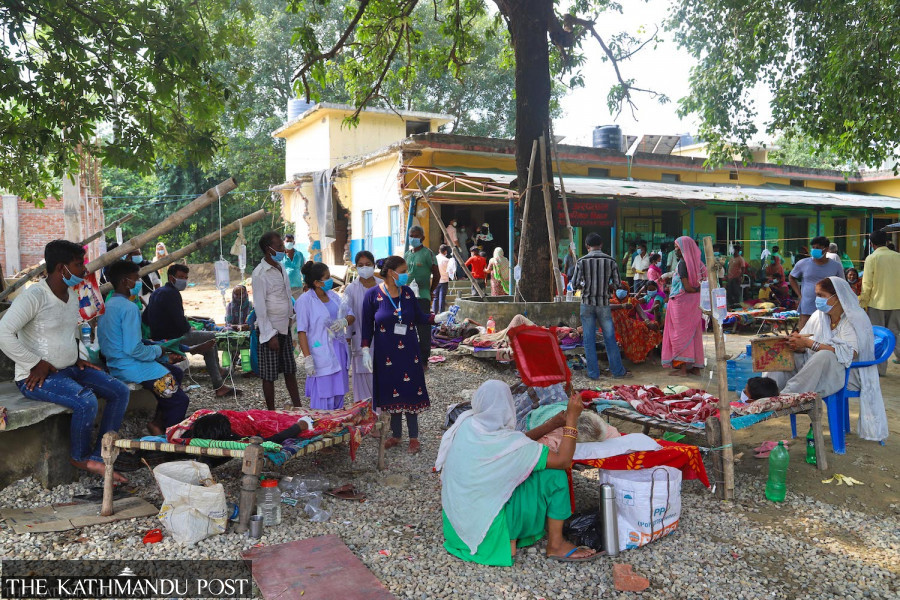Health
Health Ministry mulls vaccination in cholera-hit Kapilvastu villages
The outbreak, which killed at least four people and infected over 1,200, has yet to come under control.
Arjun Poudel
As the cholera outbreak that started around a month ago in Krishnanagar Municipality of Kapilvastu district has yet to come under control, the Ministry of Health and Population is considering launching a cholera vaccination campaign in the disease-hit villages.
Officials say a ring vaccination is the only way to control the deadly disease that has claimed at least four lives and infected over 1,200 in the municipality.
Ring vaccination is a strategy to vaccinate those who are most likely to be infected. In the said strategy, everyone who has been or could have been exposed to a patient gets vaccinated creating a ‘ring’ of protection that can limit the spread of pathogens.
“We have requested the Health Ministry and the Epidemiology and Disease Control Division to launch a cholera vaccination campaign in the affected area,” Dr Bikas Devkota, secretary for the provincial Ministry of Health and Population, told the Post, over the phone from Butwal. “It seems that it will take months for the infection to come under full control.”
Vibrio cholerae 01 Ogawa serotype was confirmed in stool samples of the infected people. Likewise, E. coli was found in the water samples in the disease-hit areas.
Cholera is a highly infectious disease that causes severe diarrhoea and vomiting, which leads to dehydration and even death within a few hours if left untreated. Escherichia coli, or E. coli, are bacteria that normally live in the intestines of people and animals. Most types of E. coli are harmless and even help keep the digestive tract healthy. But some strains can cause diarrhoea when one eats or drinks contaminated food and water.
Of the four deceased, three were minors–seven- and two-year-old boys and a five-year-old girl–from wards 7, 8 and 9 of the municipality. They died in the first week of October. Another deceased was a 45-year-old man.
Over a dozen cases of cholera are being reported from wards 7, 8 and 9 of the municipality on a daily basis.
“The number of infected patients has declined to around a dozen daily,” said Devkota. “It will take several weeks for the infection to come under control.”
Devkota said that the federal Health Ministry and the provincial Health Ministry could not do enough to control the outbreak. He said multiple agencies including those related to water and sanitation, education and communication play important roles in containing the outbreak.
Officials at the federal Health Ministry said they have been holding discussions with aid agencies to launch a vaccination campaign in the disease-hit area.
“We have been discussing the possibilities of launching a vaccination campaign in the affected areas although a final decision has yet to be taken,” said Dr Samir Kumar Adhikari, joint spokesperson for the Health Ministry.
As the Health Ministry does not procure cholera vaccines, authorities have to request aid agencies for the vaccines.
Earlier in 2014, when a cholera outbreak hit several villages in Rautahat, the ministry had carried out ring vaccination in the villages with the help of aid agencies.
Ring vaccination is a strategy to vaccinate those who are most likely to be infected. In the said strategy, everyone who has been or could have been exposed to a patient gets vaccinated creating a ‘ring’ of protection that can limit the spread of pathogens.
So far, 1,254 people have been infected with the diarrhoeal disease in Krishnanagar Municipality and of them, 21 have been receiving treatment at various hospitals, according to the Health Ministry.
Cholera continues to be a major killer in many poor countries which lack safe drinking water and proper sanitation infrastructure.
Nepal is also a cholera endemic country as cases of cholera infection are detected every year. The disease also continues to be reported in Kathmandu Valley.
Doctors say poor sanitation and contaminated drinking water are the main factors for a cholera outbreak.
“All agencies concerned should make coordinated efforts to control the outbreak,” said Dr Sher Bahadur Pun, chief of Clinical Research unit at Sukraraj Tropical and Infectious Disease Hospital. “We have been hearing complaints from officials about a lack of coordination for a long time but could not understand what has prevented the coordination.”
Several agencies of the government, including those under the Health Ministry, Ministry of Water Supply and Sanitation, Ministry of Education, Science and Technology and non-governmental agencies spend millions of rupees every year on water and sanitation. However, they have not brought the desired results.
Doctors say launching awareness drives against water-borne diseases and ensuring safe drinking water are the only ways to save people from water-borne diseases like cholera.
The World Health Organisation says cholera is a global threat to public health and an indicator of inequality and a lack of social development.
The UN health agency says that a multifaceted approach is key to controlling cholera and reducing deaths.
A combination of surveillance, water, sanitation and hygiene, social mobilisation, treatment and oral cholera vaccine are required to contain the spread of the disease.




 9.83°C Kathmandu
9.83°C Kathmandu















